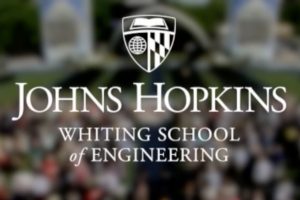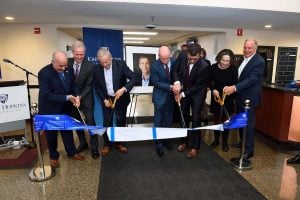
The National Science Foundation Graduate Research Fellowship Program is the oldest graduate fellowship of its kind. Fellows receive three years of financial support in the form of an annual stipend of $34,000 and a $12,000 cost of education allowance for tuition and fees paid to the institution. They have opportunities for international research and professional development, and have the freedom to conduct their own research.
“This unique program has nurtured economic innovation and leadership in the U.S. continuously since 1952—by recruiting and supporting outstanding students with high potential in science, technology, engineering, and mathematics very early in their graduate training,” said Jim Lewis, the acting assistant director for education and human resources at the National Science Foundation. “These talented individuals have gone on to make important discoveries, win Nobel Prizes, train many generations of American scientists and engineers, and create inventions that improve our lives.”
Thirteen of Johns Hopkins’ 2017 NSF Graduate Research Fellows come from the Whiting School of Engineering. They are:
- Elana Ben-Akiva is a PhD candidate in biomedical engineering. Elana currently works in the Biomaterials and Drug Delivery Lab of Jordan Green and the Bloomberg Kimmel Institute for Cancer Immunotherapy under Drew Pardoll. Elana is interested in developing polymeric nanoparticles for gene delivery and biomimetic particles that harness the immune system to treat cancer.
- Rami Walid Chakroun is a PhD candidate at the Institute for NanoBioTechnology, working at Honggang Cui’s lab. Rami aims to develop a drug-based supramolecular hydrogel, to be used for local brain tumor treatment. With great interest in teaching and research, Rami aspires to follow his dad’s footsteps in becoming an academic professor.
- Jourdan Ewoldt is a senior graduating with a degree in biomedical engineering. Jourdan has performed research in Leslie Tung’s laboratory, where she has focused on cardiac tissue engineering. She has also done research on post-stroke spasticity with the Rehabilitation Institute of Chicago and on cartilage tissue composition with the National Institutes of Health. In the fall Jourdan will begin a PhD program in biomedical engineering.
- Gregory Howard, from the University of Akron, is a PhD candidate in biomedical engineering and a member of Hai-Quan Mao’s lab where he is working at the intersection of immunology, materials science, and engineering. Greg’s main focus is the development of scalable protein- and DNA-nanoparticle vaccine platforms for emerging pathogens and cancer. Outside of the lab, Greg is active in tutoring and community outreach programs. After graduate school, he aspires to teach and to lead the development and translation of medical technologies from bench to bedside.
- Erez Krimsky is a senior graduating from Johns Hopkins with a degree in mechanical engineering. He has done research at the Hopkins Extreme Materials Institute, the United States Army Research Lab, and the Johns Hopkins Applied Physics Lab. Erez’s research at Hopkins has centered on understanding how fractures form and propagate in ceramic armor material. In the fall he will begin a PhD in mechanical engineering with a focus in robotics.
- Adam Li, a second year PhD student in biomedical engineering at Johns Hopkins University, aims to create advanced data analytics for neurosurgeons that are treating epilepsy patients. Adam’s research involves analyzing brain recordings as a networked system and characterizing network system characteristics to make predictions of the onset region in epilepsy. In addition to building clinical tools, he seeks to understand epilepsy and different clinical seizures through computational modeling at a whole-brain level. He is also an aspiring entrepreneur for healthcare technology and seeks to use data science to revolutionize the way we diagnose and treat patients.
- David Maestas is a PhD candidate in biomedical engineering. David currently works in the Translational Tissue Engineering Center in the laboratory of Jennifer Elisseeff. David’s research and passion centers around regenerative medicine. His work seeks to investigate biomaterial interactions with the immune system and how both can be utilized to promote functional tissue regeneration after injury.
- Denise Neibloom is a PhD candidate in chemical and biomolecular engineering. Denise currently works on the role of nanoparticles in spontaneous emulsification and how this phenomenon can be utilized to create complex materials for a variety of applications. She hopes to apply her work to the large-scale production of photovoltaics. Denise intends to use her background in materials development to help shape government policies on energy technology and the environment.
- Brian Ryu, from Johns Hopkins University, is a senior graduating with degrees in chemical and biomolecular engineering and applied mathematics and statistics. Brian has done research on hydrodynamic properties of biomimetic surfaces under professor Joelle Frechette. He has previously participated in an REU program at Georgia Institute of Technology and an internship at Genentech. In the fall, he will begin a PhD program in chemical engineering.
- Erica Schwarz is a senior graduating with degrees in biomedical engineering and computer science. Erica has done research in computational cardiology and machine learning and has worked in labs at the University of Arizona, Johns Hopkins, and the National University of Singapore.
- Joshua Shubert is a PhD student in electrical and computer engineering and is part of the Photoacoustic and Ultrasound Systems Engineering Lab. He is working on developing autonomous robotic ultrasound and photoacoustic imaging systems to aid in radiation-free diagnostic and intraoperative imaging. Joshua says his goal is to combine autonomous imaging robots with autonomous surgical robots, thus creating an entirely autonomous surgical system in order to bring state of the art surgical practices to both resource limited and extreme environments.
- Emily Wisniewski, from Northeastern University, is a PhD candidate in chemical and biomolecular engineering. She works in the lab of Konstantinos Konstantopoulos. Emily’s current research aims to improve our understanding of cancer metastasis by elucidating mechanisms of confined cancer cell migration. After she completes graduate school, Emily aspires to become a leader in the biotechnology field and develop novel therapeutics for patients.
- Hannah Zierden, from The Ohio State University, is a PhD candidate in chemical and biomolecular engineering. Working in the Center for Nanomedicine with Laura Ensign and Justin Hanes, Hannah is currently developing nanotechnology-based tools for the characterization and prevention of preterm birth. She studies physiological changes that occur during pregnancy as well as techniques for engineering therapeutic nanocarriers.
View the full list of Johns Hopkins’ 2017 NSF Graduate Research Fellows at The Hub.


